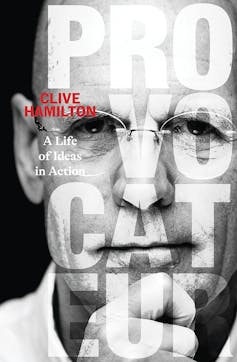Clive Hamilton's activism memoir wars with neoliberals, the 'naive' left and China
- Written by Geoffrey Robinson, Senior Lecturer, School of Humanities and Social Sciences, Deakin University

Clive Hamilton personifies the Australian progressive “public intellectual”. He’s a prolific author of opinion articles and books, concerned “to make a difference in the world” by persuading people to engage with “powerful ideas”.
His memoir describes almost 40 years of activism. The tone is often confessional: he admits to an introvert’s terror at electioneering and a white progressive’s anxiety about what to say to Indigenous people. Despite this, Provocateur[1] is most of all a narrative of “ideas in action”, embodied by one individual.
Review: Provocateur: A life of ideas in action – Clive Hamilton (Hardie Grant)
Hamilton’s fame is closely linked to The Australia Institute[2], which he founded in 1994. Since then it has come to dominate the progressive think-tank landscape. His narrative offers much guidance for think-tank progressives: a relentless focus on media relations and public impact, and most of all, an ability to discern the mood of progressive opinion. Hamilton may be aligned with the Greens, but he has little time for the amateurism and self-absorption that were once Greens traditions.
Appealing to the unconverted
Progressives, Hamilton argues, should initially talk among themselves – but then move on to appealing to the unconverted. He is an enthusiast for focus groups and opinion polling. In the battle for media attention, Hamilton is aware of the power of provocation and outrage. He admits he sometimes deliberately overstates his certainty, aiming to generate opposition. He has little interest in understanding the motives of his opponents, who include “postmodern” academics, Chinese nationalists, pornography consumers and affluent suburbanites.

















